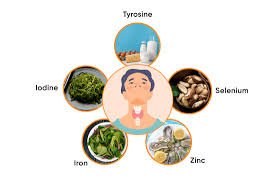The thyroid gland is responsible for regulating various bodily functions by releasing specific hormones in precise amounts.
A deficiency or excess of these hormones can lead to various thyroid disorders, affecting the body’s energy supply.
A significant number of women worldwide suffer from thyroid-related diseases.
It is estimated that the prevalence of thyroid disorders is around 4 to 5 percent in men, while in women, it ranges from 10 to 12 percent. However, nature has hidden the cure for thyroid and many other diseases in different nutrients.
Iodine
For optimal function, the thyroid gland requires 15 to 20 milligrams of iodine.
The deficiency of iodine is not only a problem for Pakistanis but also affects people in many other countries.
This is why medical experts recommend iodine-fortified salt and dairy products for thyroid patients.
Additionally, seafood such as fish and shrimp are rich natural sources of iodine, but their consumption should be in moderation to avoid potential harm.
Green Vegetables
To keep the thyroid balanced and active, the body requires an adequate intake of food.
Experts suggest increasing calorie intake through nutritious foods.
Besides dairy and meat, consuming more vegetables is essential, especially green vegetables like spinach, lettuce, and cabbage, which are excellent sources of magnesium.
Nuts
Cashews, almonds, and pumpkin seeds are great sources of iron.
According to medical experts, nuts are not only rich in iron but also contain significant amounts of selenium, which helps improve thyroid gland function.
A handful of nuts a day can fulfill the body’s selenium requirements.
Oatmeal
Choosing oatmeal for breakfast is a great option. Oats are naturally gluten-free, but there is a possibility they might be processed in facilities handling gluten-containing grains.
Therefore, when purchasing oats, always check the label for “gluten-free” to ensure they have not been processed alongside gluten-rich foods.
Try eating oats with almonds or fresh fruits for added benefits.
Rice
Rice and wheat are staple foods for many people. The selenium in rice helps maintain healthy skin, membranes, and the thyroid.
For dinner, you can have grilled salmon with roasted broccoli and brown rice, ensuring that the salt used in preparation is non-iodized.
Foods Thyroid Patients Should Avoid
When it comes to fruits and vegetables, not all are beneficial for thyroid patients.
For example, peaches, pears, turnips, beets, and cauliflower contain compounds that may aggravate thyroid disorders.
Additionally, medical experts advise thyroid patients to avoid heavy, spicy foods that can cause constipation.







 Today's E-Paper
Today's E-Paper